| President of Columbia University | |
|---|---|
| Appointer | Trustees of Columbia University in the City of New York |
| Formation | 1754 |
| First holder | Samuel Johnson |
| Website | https://president.columbia.edu/ |
The president of Columbia University is the chief officer of Columbia University in New York City. The position was first created in 1754 by the original royal charter for the university, issued by George II, and the power to appoint the president was given to an autonomous board of trustees. The university suspended operations upon the outbreak of the American Revolutionary War, during which no individual served as president. When it was resuscitated by the New York State Legislature, the university was placed directly under the control of the Board of Regents of the University of the State of New York; its chancellor, George Clinton, served as the de facto president of Columbia University.[1] Through the efforts of Alexander Hamilton and John Jay, control of the university was returned to a private board of trustees in 1787, which has to this day maintained the right to appoint or remove the president, who also serves on the board ex officio.[1] The university's first president was Samuel Johnson, who held the office from 1754 to 1763, and its 20th and current president is Minouche Shafik, whose tenure began on July 1, 2023.
Upon the founding of the university, it was stipulated by the vestrymen of Trinity Church, on whose land King's College sat, that every president must be a member of the Church of England; otherwise, the land would revert back to the church.[2] As such, every single president of the university until the appointment of Dwight D. Eisenhower was Anglican, while the first six presidents, with the exception of William Samuel Johnson, were all either Anglican priests or bishops.[3] Michael I. Sovern, appointed in 1980, was the university's first Jewish president.[4] In 2023, Minouche Shafik became the woman to serve as president of the university.[5]
From 1902 to 1970, every president was involved in foreign relations in some capacity: Nicholas Murray Butler was the president of the Carnegie Endowment for International Peace from 1925 to 1945, and was awarded a Nobel Peace Prize for his promotion of the Kellogg–Briand Pact; Dwight D. Eisenhower served as Supreme Commander of the Allied Expeditionary Force during World War II, and after his tenure would serve as President of the United States; and Grayson L. Kirk and Andrew W. Cordier were both instrumental to the formation of the United Nations.
As established by Columbia University's governing statutes, it is the duty of the president to exercise jurisdiction over all affairs of the university; to call special meetings of the University Senate, faculties, and administration; to report to the Trustees of Columbia on the state and needs of the university annually; and to administer discipline. The consent of the president is necessary for any act made by a faculty or administrative board, unless their veto is overridden by two-thirds vote. Additionally, the president is able to grant leaves of absences, give faculty permission to use university laboratories for experiments, and confer academic and honorary degrees on behalf of the board of trustees.[1]
The president is ex officio a permanent member of the Pulitzer Prize Board, and has annually presented the awards to its recipients since 1984.[6] In addition, the president is an ex officio member of the board of trustees of Barnard College.[7]
List of presidents
| # | Image | President | Birth year–Death year | Years as president | Notes |
|---|---|---|---|---|---|
| 1 | 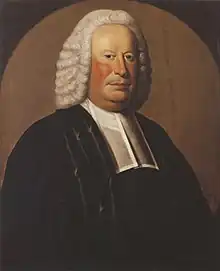 | Samuel Johnson[8] | 1696–1772 | 1754–1763 | |
| 2 | 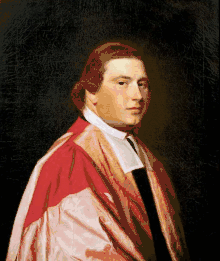 | Myles Cooper[8] | 1735–1785 | 1763–1775 | |
| – |  | Benjamin Moore, B.A. 1768[8] | 1748–1816 | 1775–1776 | acting |
| – |  | George Clinton[9] | 1739–1812 | 1784–1787 | as chancellor of the University of the State of New York; 1st governor of New York and later 4th vice president of the United States |
| 3 | .jpg.webp) | William Samuel Johnson[8] | 1727–1819 | 1787–1800 | signed the Constitution of the United States; served as United States Senator from Connecticut |
| 4 | 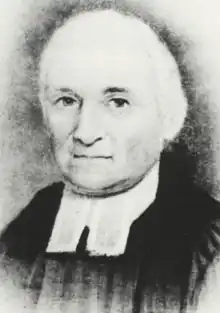 | Charles Henry Wharton[8] | 1748–1833 | 1801–1801 | |
| 5 |  | Benjamin Moore, B.A. 1768[8] | 1748–1816 | 1801–1810 | |
| 6 |  | William Harris[8] | 1765–1829 | 1811–1829 | shared authority with Provost John Mitchell Mason until 1816 |
| 7 | .jpg.webp) | William Alexander Duer[8] | 1780–1858 | 1829–1842 | |
| 8 | 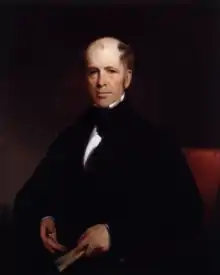 | Nathaniel Fish Moore, B.A. 1802[8] | 1782–1872 | 1842–1849 | |
| 9 | 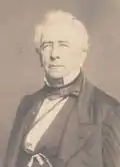 | Charles King[8] | 1789–1867 | 1849–1863 | presided over move to Madison Avenue campus |
| 10 | 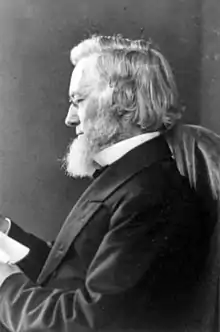 | Frederick Augustus Porter Barnard[8] | 1809–1889 | 1864–1888 | |
| – | 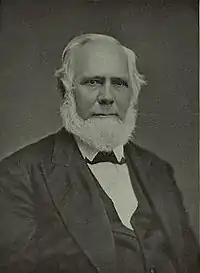 |
Henry Drisler, B.A. 1839[10] | 1818–1897 | 1867, 1888–1889 | acting |
| 11 | 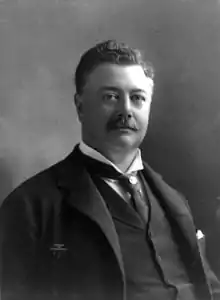 | Seth Low, B.A. 1870[8] | 1850–1916 | 1890–1901 | presided over move to Morningside Heights campus; 23rd mayor of Brooklyn and 92nd mayor of New York City |
| – | 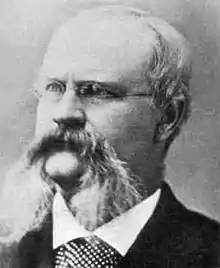 |
John Howard Van Amringe, B.A. 1860, M.A. 1863[11] | 1836–1915 | 1899 | acting |
| 12 | 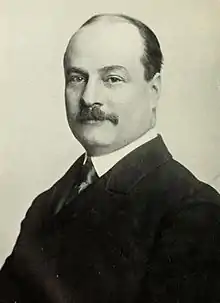 | Nicholas Murray Butler, B.A. 1882, M.A. 1883, Ph.D. 1884[8] | 1862–1947 | 1902–1945 | Nobel Peace Prize laureate in 1931 |
| – | 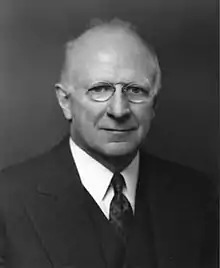 |
Frank D. Fackenthal, B.A. 1906[8] | 1883–1968 | 1945–1948 | acting |
| 13 |  | Dwight D. Eisenhower[8] | 1890–1969 | 1948–1953 | on leave while Supreme Allied Commander Europe of NATO, later 34th president of the United States |
| 14 |  | Grayson L. Kirk[8] | 1903–1997 | 1953–1968 | resigned after 1968 protests |
| 15 | 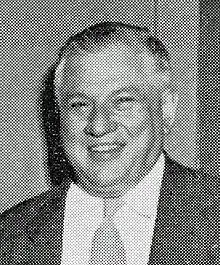 | Andrew W. Cordier[8] | 1901–1975 | 1969–1970 | |
| 16 | William J. McGill[8] | 1922–1997 | 1970–1980 | ||
| 17 |  | Michael I. Sovern, B.A. 1953, J.D. 1955[8] | 1931–2020 | 1980–1993 | |
| 18 | .png.webp) | George Erik Rupp[8] | born 1942 | 1993–2002 | |
| 19 |  | Lee C. Bollinger, J.D. 1971[8] | born 1946 | 2002–2023 | presided over construction of Manhattanville campus |
| 20 | 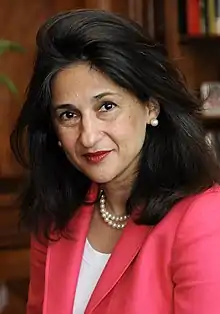 |
Minouche Shafik, Baroness Shafik[5] | born 1962 | 2023– | deputy governor of the Bank of England; member of the House of Lords |
References
- 1 2 3 "Charters and Statutes" (PDF). secretary.columbia.edu. January 2022. Archived (PDF) from the original on February 5, 2023. Retrieved June 9, 2023.
- ↑ McCaughey, Robert (2003-10-22). Stand, Columbia: A History of Columbia University. Columbia University Press. p. 20. ISBN 978-0-231-50355-6.
- ↑ McCaughey, Robert A. (2003). Stand, Columbia : a History of Columbia University in the City of New York, 1754-2004. Columbia University Press. ISBN 978-0-231-13008-0.
- ↑ "Michael I. Sovern". library.columbia.edu. Archived from the original on 2022-06-28. Retrieved 2022-06-28.
- 1 2 "Columbia Hires First Female Leader as Shafik Succeeds Bollinger". Bloomberg.com. 2023-01-18. Archived from the original on 2023-01-18. Retrieved 2023-01-18.
- ↑ Topping, Seymour. "Administration of the Prizes". www.pulitzer.org. Archived from the original on 2016-04-15. Retrieved 2021-07-03.
- ↑ "Charters and Statutes | Office of the Provost". provost.columbia.edu. Retrieved 2023-07-03.
- 1 2 3 4 5 6 7 8 9 10 11 12 13 14 15 16 17 18 19 20 21 "Columbia University President Profiles | Columbia University Libraries". library.columbia.edu. Archived from the original on 2021-06-16. Retrieved 2021-06-18.
- ↑ "Founders Online: From Alexander Hamilton to George Clinton, [26 November 1784–1 …". founders.archives.gov. Archived from the original on 2021-06-30. Retrieved 2021-06-18.
- ↑ "Columbia's Deans". Columbia Daily Spectator. January 25, 1916. Archived from the original on June 27, 2021. Retrieved June 27, 2021.
- ↑ University, Columbia (1904). A History of Columbia University, 1754-1904. Columbia University Press, The Macmillan Company, agents. Archived from the original on 2022-04-25. Retrieved 2023-06-09.
